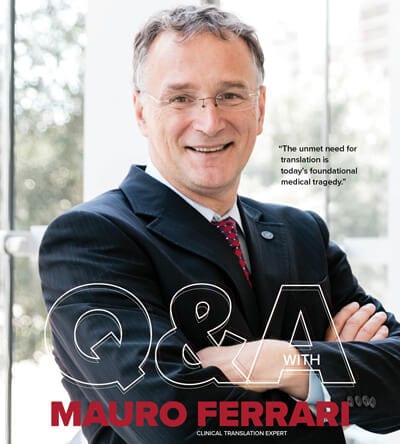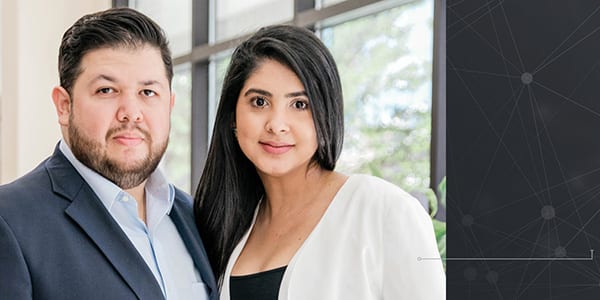Masters of Biotech
 The Master in Clinical Translation Management program is a collaboration between University of St. Thomas and Houston Methodist Research Institute (HMRI), designed to help students learn how to turn basic discoveries that occur in laboratories into usable drugs, medical devices or clinical processes.
The Master in Clinical Translation Management program is a collaboration between University of St. Thomas and Houston Methodist Research Institute (HMRI), designed to help students learn how to turn basic discoveries that occur in laboratories into usable drugs, medical devices or clinical processes.
We sat down with Dr. Mauro Ferrari, chief commercialization officer of Houston Methodist and president of the Houston Methodist Institute for Academic Medicine, to discuss the impact of the degree on the medical field.
Q. What influenced the partnership with Houston Methodist Research Institute and University of St. Thomas?
A. There was a great opportunity, because St. Thomas was in the process of expanding its graduate programs and…for Methodist, there was a need to create a program that would allow us to translate discoveries into medical products for patients.
Q. What is the MCTM program, and what does it mean to you?
A. Everybody knows how important medical research is. What many people don’t know is how long it takes for a discovery to become a product. On average in this country, its takes 17 years—from the moment that the science is proven—to have it become an actual product.
Discovery is not the problem; the problem comes with creating a product after the science discovery, which is what we call translation. It also costs 3 billion dollars, and because of this, very few medical discoveries that can help people ever make it to the clinic. Imagine the tragedy. For the poorer parts of the world, the scientific discoveries almost never turn into reality for the people who are suffering and dying.
The unmet need for translation is today’s foundational medical tragedy. We are at the right time, at the right place, a little bit ahead of the curve, which is where we want to be. In a short period of time, our program has become nationally recognized as one of the best programs in the nation, and that gives me great joy—not so much because we beat the competition, but because this will contribute to many lives saved.
Q. You were appointed by Pope Francis to serve on the Pontifical Academy for Life Council. How do you contribute to this council?
A. Pontifical Academy is an advisory body to Pope Francis, and it was formed as a foundation to have a body of advisors that could give the Pope perspective on the transformational entities in the world. Pope Francis changed the makeup of the Academy and brought in people from all over the world of different religious backgrounds. I am a member of two working groups: one that deals with ethics that come with new discoveries in neurology and technology; the other one deals with end-of-life care.
Q. How do you find a balance in faith and science?
A. To me, science is manifested through faith; I could not work on the clinical or laboratory side without faith. On the medical side, as we provide healthcare to people, we are looking at sharing a journey, accompanying people that we serve. When you accompany people toward the end of their life, that mission is so central to the definition of what medicine really is. I think that’s where it magically transforms from a job to a mission to ministry.
Program Snapshot
“The MCTM program bridges the critical gap between science and business, and supports entrepreneurship in the biomedical space. By empowering people to manage the clinical translation process, it can help reduce the time and cost to bring a technology to market and lower the cost to the consumer.” – Dr. Beena George, dean of the Cameron School of Business
Students of the Master in Clinical Translation Management program (MCTM) are on the cutting-edge of bringing biomedical innovation to market to benefit patients in need.
A unique collaboration between the University of St. Thomas Cameron School of Business and Houston Methodist Research Institute (HRMI), the MCTM program is designed to bridge the gap between science and business, and reduce the time and cost bringing technology to market.
The MCTM degree will help those with an understanding of the biotechnology industry to identify and address the critical issues facing biotech organizations, assess a product’s commercial potential and navigate the path of clinical translation.
The program is offered primarily online, in an accelerated one-year program, with less than 12 face-to-face class days. Students have access to hands-on translational projects, seminars led by life science organizations and direct access to experts in the translational research space in this dynamic program.
Integrated into one of the nation’s finest hospitals, the Houston Methodist Research Institute provides the technology and support needed to effectively bring cures through all stages of medical research and to patients around the world.
“Other programs focus on either the clinical research or the business side of the clinical translation,” said Tong Sun, vice president of central operations at the Houston Methodist Research Institute. “The MCTM program emphasizes both and connects students with real world projects that the Houston Methodist Research Institute is investing in.”
Recent student projects:
- Developing a wearable device able to non-invasively stimulate the brain at multiple sites for treating chronic ischemic stroke patients
- Utilizing a novel PET imaging probe to selectively target Hodgkin Lymphoma tumors for enhanced cancer detection
- Developing the strongest biodegradable polymer to help treat Improvised Explosive Device-inflicted blast injuries to the legs to close gaps in fractured bones and allow for osteoregenerative bone growth

Marco Morales Garza and Lourdes Chacon
The MCTM degree ranks No. 7 out of 25 top clinical research management programs in the country in 2017-18 by Healthcare Management Degree Guide and No. 8 by College Choice, both leading authorities on college rankings and resources.
“We had travel opportunities in the MCTM program that expanded my global network with leaders in the overseas business community and enabled me to build strong networks.” – Lourdes Chacon
UST’s program stands out among other top clinical research master’s degrees, the Guide said, for its ability to help STEM experts “translate” their scientific expertise to business savvy.
“The University of St. Thomas Master in Clinical Translation Management program offers an exciting opportunity to get in on the ground floor of an emerging field in the pharmaceutical and biomedical market,” according to the Guide.
Graduates and duo, Marco Morales Garza and Lourdes Chacon completed the program in 2018 and have since made a huge impact in the clinical translation market.
Morales is a managing partner at Clinicore International, working with top pharma companies, private equities and venture capital groups for investment in healthcare.
Chacon is a postdoctoral research associate at the Texas Heart Institute, executing multiple scientific projects by applying clinical applications. She also works with a nonprofit organization in Honduras with patients in late stagesof cancer, incorporating social entrepreneurship.
For more information about the Master in Clinical Translation Management program, visit stthom.edu/MCTM